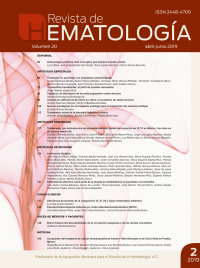Tratamiento con midostaurina de leucemia mieloide aguda con mutación en FLT-3 en México: los retos en un país en desarrollo
Rev Hematol Mex. 2019 April-June;20(2):117-123. https://doi.org/10.24245/rhematol.v20i2.2980
Eduardo Terreros-Muñoz,1 Juan Carlos Solís-Poblano,2 Elba Nydia Reyes-Pérez,3 Jorge Luis López-Marthen,4 Martha Alvarado-Ibarra,5 Lidia Adela García-Stivalet,2 Alejandro Limón-Flores,2 Luis Meillón-García,1 Efreen Horacio Montaño-Figueroa,6 Alva Nora Zaragoza-Vázquez,7 Roberta Demichelis-Gómez8
1 Hospital de Especialidades, Centro Médico Nacional Siglo XXI, IMSS, Ciudad de México.
2 Hospital de Especialidades Centro Médico Nacional Manuel Ávila Camacho, IMSS, Puebla, México.
3 UMAE 14, Centro Médico Nacional Adolfo Ruiz Cortínez, IMSS, Veracruz, México.
4 Clínica Candia, Puebla, México.
5 Centro Médico Nacional 20 de Noviembre, ISSSTE, Ciudad de México.
6 Hospital General de México, Ciudad de México.
7 Hospital General Regional núm. 1, IMSS, Chihuahua, México.
8 Instituto Nacional de Ciencias Médicas y Nutrición Salvador Zubirán, Ciudad de México.
Abstract
BACKGROUND: The prognosis of acute myeloid leukemia (AML) is defined by cytogenetic and molecular assessment.
OBJECTIVE: To analyze the data of eight centers of Mexico treating patients with acute myeloid leukemia with the standard treatment of their institution plus midostaurin.
PATIENTS AND METHOD: A retrospective study was done with all the patients with newly diagnosed AML in eight centers who were assessed for FLT3-ITD and TKD mutations from September 2016 to September 2017 and treated with midostaurin if they had any FLT3 mutation. We analyzed the data of eight centers in Mexico that treated AML patients with midostaurin and the standard treatment of their institution.
RESULTS: We assessed FLT3 mutations in 79 patients with AML and found mutations in 11 (13.9%). We treated 7 AML-patients with chemotherapy and midostaurin: The CR rate was 100%. With a medium follow-up of 32.8 weeks, the overall survival and disease free survival were 71.4%. We reported adverse events associated with midostaurin in 57% of the total number of patients (4/7), all of them grade 1-2. In most cases the adverse effects were nausea and fatigue.
CONCLUSION: We have found, in concordance with previously reported data, that treatment with midostaurin is well tolerated and produces sustained responses. In developing countries we face for specific challenges for the diagnosis and treatment of AML.
KEYWORDS: Acute myeloid leukemia; Midostaurin.
Resumen
ANTECEDENTES: Hace poco se aprobaron para el tratamiento de la leucemia mieloide aguda terapias blanco dirigidas a mutaciones específicas.
OBJETIVO: Analizar los datos de ocho centros en México que trataron pacientes con leucemia mieloide aguda con el tratamiento estándar de su institución más midostaurina.
MATERIAL Y MÉTODO: Estudio retrospectivo en el que de septiembre de 2016 a septiembre de 2017 se incluyeron todos los pacientes con diagnóstico reciente de leucemia mieloide aguda en quienes se realizó la búsqueda de mutaciones en FLT3.
RESULTADOS: Se incluyeron 79 pacientes con leucemia mieloide aguda y se encontraron mutaciones en 11 (13.9%). Se trataron 7 pacientes con quimioterapia estándar y midosaturina. La tasa de remisión completa fue de 100%, con mediana de seguimiento de 32.8 semanas, la supervivencia global y libre de progresión fueron de 71.4%. Se reportaron eventos adversos asociados con midostaurina en 57% de los casos, todos ellos grado 1-2. Los eventos adversos más frecuentes fueron náusea y fatiga.
CONCLUSIONES: Encontramos, en concordancia con la información publicada, que el tratamiento con midostaurina es bien tolerado y efectivo. En países en desarrollo, el acceso a pruebas diagnósticas y a terapias novedosas son retos muy importantes para el diagnóstico y tratamiento de la leucemia mieloide aguda.
PALABRAS CLAVE: Leucemia mieloide aguda; midostaurina.

